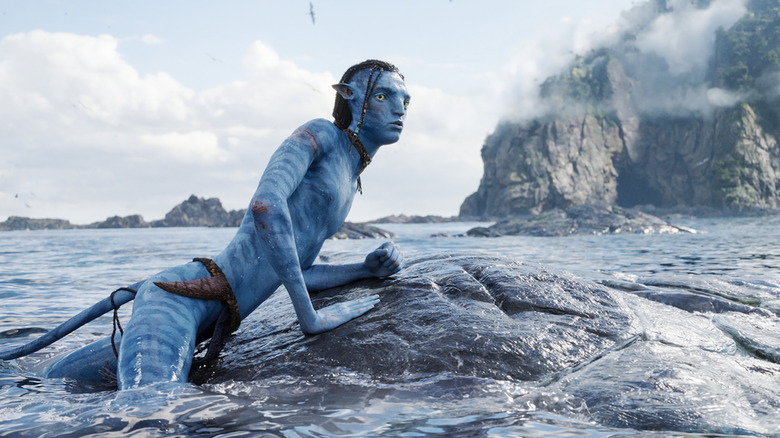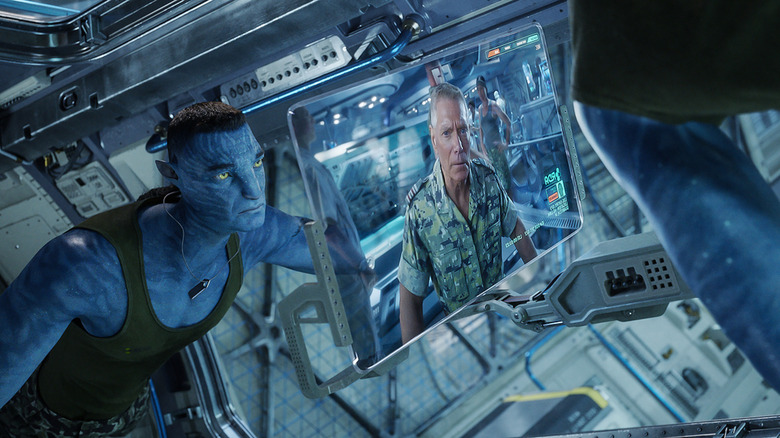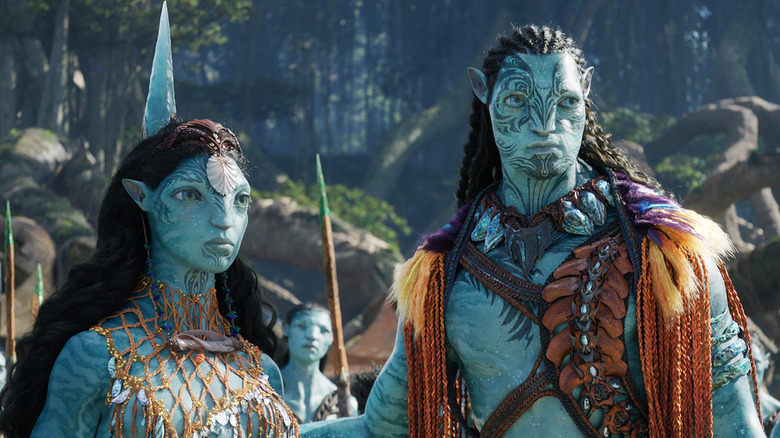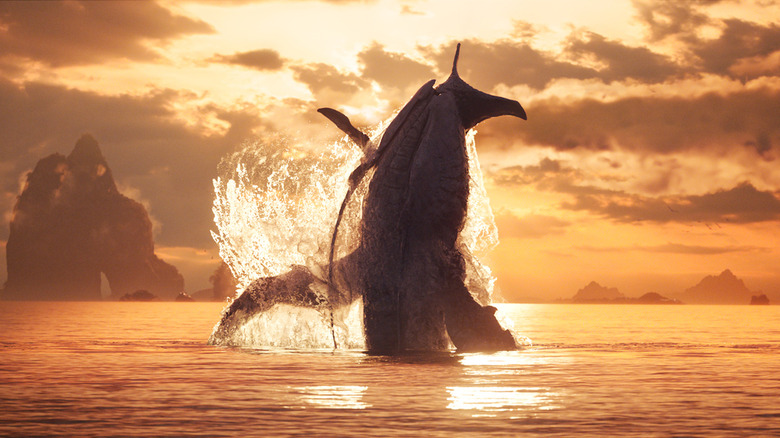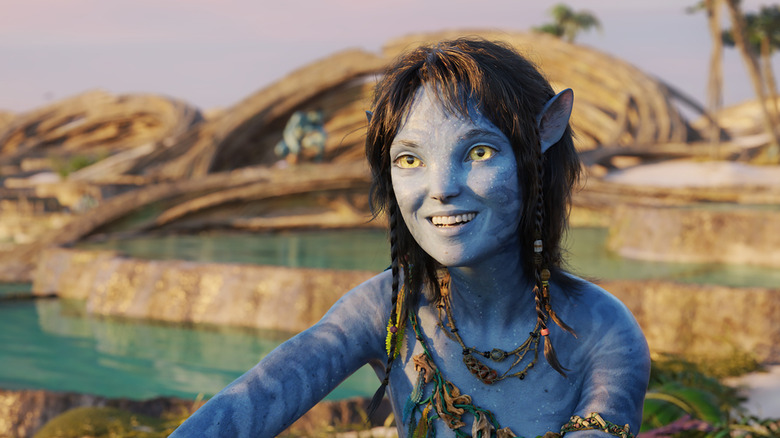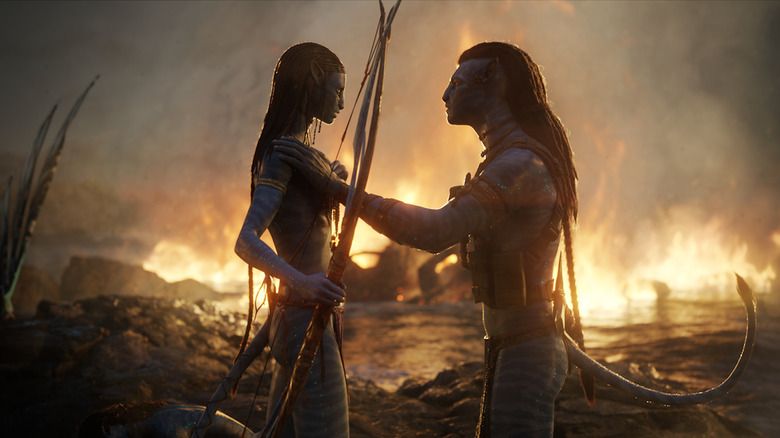Avatar: The Way Of Water Improves Upon The First Film's Flaws In Every Way
This article contains major spoilers for "Avatar: The Way of Water"
It has been something of a cliche for many movie bloggers and film fans to criticize "Avatar" as having no cultural impact, but the argument has some merit. How often do people excitedly talk about "Avatar" like they do about Marvel, DC, "Star Wars," or other James Cameron vehicles, like "Aliens," "Titanic," or even "The Abyss?" But the negativity around "Avatar" also has an air of the dogpile that is inevitable when a film becomes the biggest, highest-grossing thing of all time. People have the urge to put storytellers on a pedestal just to turn around and knock them off it. We've seen it again and again, sometimes deserved, sometimes not.
As a massive fan of James Cameron, I felt a little out of step in 2009 because I didn't love "Avatar" with the same fervor many others did. Yes, it was a spectacle. Yes, it did inspire a resurgence of 3D. But did it live up to the high standards Cameron has set for himself as an action director who also deeply understands how to engage their audience emotionally? For me, it didn't and that's okay. Not everything is supposed to be for everybody.
I admittedly walked into "Avatar: The Way of Water" with a bit of a "prove it" attitude. Obviously, I hoped for the best. It is James Cameron, after all, and I never ever want to feel ambivalent towards any of his work, but it is hard to get fired up for a sequel to a film you didn't care much for, especially when said sequel is over three hours long.
So, count me shocked that I vastly preferred "The Way of Water" to the first "Avatar." What we're going to look at today is why I felt the sequel was miles better than the first movie and I think a good place to start is the bad guys.
The villains
The first "Avatar" is an incredibly complex simple story, which sounds like a putdown, but I'd wager that's why it was such a huge success. The good guys/bad guys were deliberately drawn to be as cut and dry as the white hat/black hat days of the old Hollywood western. That simplicity turned me off of the first movie, but I can't deny that the intentionally straightforward story allowed the spectacle to take center stage and was what got so many butts in seats that there are lingering tales of Fox accountants in a secluded office in Los Angeles still counting the box office dollars one by one to this very day.
"The Way of Water" fixes this by giving us a complex villain, which, ironically, is the same villain from the last movie, just taller and bluer. In the first film, Stephen Lang's Quaritch was a tough, mean ol' cuss who was kind of like if you merged Michael Biehn's Hicks from "Aliens" and Coffey from "The Abyss."
He was mean and he really hated the indigenous Na'vi. Eagle-eyed viewers might have noticed that Quaritch kinda sorta died in the last movie, but never fear! He is reborn in his own Na'vi avatar that carries his core memories and personality.
This is already way more interesting because the human who hates the big blue cat people is now having to find himself living in the body of a big blue cat person.
Quaritch's vendetta in this movie is to get revenge for his own death. Jake Sully abandoned his own people to live as a Na'vi, which might tick him off even more than getting killed in a fight with the dude, but it quickly becomes clear that in hunting Jake Sully, Quaritch is actually following in his big, blue footsteps.
They both live in their avatars now. In his own way, Quaritch is making the same journey that Jake did in the first one. He bonds with his own flying beast, he's excited about the power that comes with his new body and, we come to find out, he even has his own family that he cares for.
He's absolutely as ruthless as he was in the first film, but there's a lingering doubt in the villain this time. It took him becoming an alien to discover his own humanity, but the good is starting to poke through a tad, which makes him a significantly more complex villain than he was the first time around.
The location
The first hour of "The Way of Water" is very much like the original "Avatar," boasting beautiful CGI dense jungle shots mixed with the trademark James Cameron used-world military vehicles. Then the movie leaves the jungle and heads to the ocean and that's when it really soars for me.
Maybe I just like the ocean more than jungles? Who knows? But I got that rush of excitement at exploring an alien world that I seemed to miss in the first movie. Many loved the world-building of the 2009 film and I'm not here to challenge that. I'm just saying that for me, the ocean environment was way more engaging for me as a viewer.
I think a lot of it has to do with the main characters all being "fish out of water" (no pun intended) and the variety that comes with an ocean environment. You can get both claustrophobic and wide-open vistas out of it, and the sea life just feels more in line with the designs of Pandora's creatures.
We also know of Cameron's deep, abiding love of the ocean and I think that shines through here in a way that his love of the jungle maybe didn't. He is a conservationist and he cares for both, clearly, but if there was any doubt of which he prefers, just look at how he shoots them both.
He shoots the ocean in "The Way of Water" like how Hitchcock used to shoot his blonde leading ladies. This dude is obviously in love with all aspects of living and surviving in the water. He respects the ocean and all its life to such a degree that when it's violated you get just as furious as the Na'vi.
The MacGuffin
In the first film, the thing the "Sky People" wanted was "unobtainium," a MacGuffin that has been something of a punchline since that movie came out. Unobtanium is a real term, but it sounds so much like sci-fi/fantasy writer BS that it was hard to take seriously.
At the end of the day, it was pretty much just a shiny stand-in for any kind of energy source that humanity can only get by destroying nature like oil, natural gas, lumber, etc. In the first movie, it was really just an excuse for these miners from Earth to destroy the natural beauty of a foreign land because, hey ... humans need it.
The MacGuffin this time out is just as ridiculous, but much more emotionally placed. This time it's a secretion from a whale-like being that is said to stop aging in humans, which naturally means it's extremely valuable. The only problem is you can only get it by killing these giant, peaceful creatures and sucking their brain juice out.
Now, this definitely continues the first film's parallels to the white man dominating indigenous lands since all the "Sky People" do is kill these giant beings, take a small vial of brain liquid, and leave the carcass behind. Sounds a lot like how the westward expansion almost made the buffalo extinct, doesn't it?
This MacGuffin is an emotional gut punch in a way that unobtainium could never be. That one's just a rock to be mined. This one requires the hunting and slow death of an innocent, intelligent and compassionate creature. Even though it's very much in the background in its importance to the movie, the time that is spent on it is naturally much more emotionally charged and invested.
The message
Much like "The Fast and the Furious" before it, "Avatar: The Way of Water" is all about family. That's at the heart of every aspect of this film. Jake and Neytiri have a family they are willing to do anything to protect. The leaders of the water tribe have a family they want to protect. Hell, even Quaritch has an estranged son and his feelings towards this boy he doesn't know is a key turning point for this character.
The whale creatures are also deeply connected to their families, which makes the humans hunting them even more despicable. Beyond all the spectacle is a beating, emotional heart, which I don't feel was at the forefront enough in the first film. Yes, you got Jake and Neytiri's love story, but that wasn't enough to engage me last time out, however, I totally buy the fears and anger and love and annoyance of all the families at play in the sequel.
None of the families depicted in this film are perfect, which makes them ring true. Every family has its ups and downs, so the fact that Jake isn't a perfect father and his children (both natural and adopted) can be brats sometimes, just makes all the characters richer in their accuracy to my own lived experience.
Final judgment
I found the first "Avatar" to be a fairly surface-level spectacle with a well-worn plot that I felt I had seen done better in other places. I appreciated the movie on a technical level, but couldn't connect to it emotionally.
However, the sequel really rises above, not content just to bank on what worked before and thus it has a fresh look and feel, but more importantly Cameron and his co-writers Rick Jaffa and Amanda Silver really made sure to add in layers of emotional complexity. Sometimes they use a shorthand that might be considered emotional manipulation (looking at you, whale creatures), and sometimes that comes through some deep character examination, but the point is they really set out to deepen the world and the experience of watching this movie.
By not making everything so black and white, good vs evil, my interest in the world of Pandora has increased tenfold. So much so, in fact, that I find I'm actually excited to see the sequels. While I may not be painting myself blue next Halloween, I doubt I'll be walking into "Avatar 3" with a "prove it" mentality as I did with this one.
